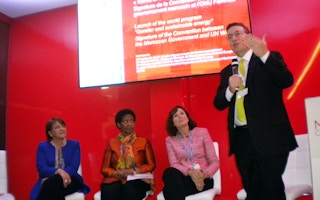The United Nations agencies for environment and women on Tuesday launched a landmark initiative to help women in developing countries gain access to sustainable energy and opportunities to become renewable energy entrepreneurs.
To continue reading, subscribe to Eco‑Business.
There's something for everyone. We offer a range of subscription plans.
- Access our stories and receive our Insights Weekly newsletter with the free EB Member plan.
- Unlock unlimited access to our content and archive with EB Circle.
- Publish your content with EB Premium.
Unveiled at the sidelines of the United Nations climate change conference in Paris, the Women’s Sustainable Energy Entrepreneurship and Access programme aims to remove “structural barriers and discrimination” preventing women from accessing renewable resources and earning a livelihood from it.
These include social norms and stereotypes that confine women to unpaid domestic work, the notion that women are not capable entrepreneurs, and a shortage of women in energy policy formulation.
In the programme’s initial phase, the United Nations Environment Programme (UNEP) and UN Women will work with policymakers from six countries - Senegal, Morocco, Myanmar, India, Indonesia, and Bolivia - to develop plans to address these issues.
Phumzile Mlambo-Ngcuka, executive director, UN Women, said at the launch at Le Bourget, Paris, where the talks are being held, that this “will ensure that we empower and strengthen women so they can play a role at the policy level, the delivery level but also in managing the efficient use of energy at the household level”.
“We will work with governments because for many of these barriers to be removed systematically and sustainably, the government has to participate,” she added, noting that this programme is the first concrete collaboration to emerge from an ongoing partnership between UNEP and UN Women.
Vulnerable but powerful
In developing countries, women are disproportionately affected by energy poverty, noted UN Women.
For example, in homes which lack access to clean cooking fuels, women are most exposed to air pollution from wood fires. They also have to walk the furthest to fetch fuel, and a lack of electricity at home undermines access to education.
“
We will work with governments because for many of these barriers to be removed systematically and sustainably, the government has to participate.
Phumzile Mlambo-Nguka, executive director, UN Women
But as household energy managers, women also make excellent entrepreneurs who can expand renewable energy adoption in their communities, said Mlambo-Nguka.
“Women can build distribution and service networks and also have easier access to other women who are energy managers in their homes,” she said. Financiers may be apprehensive about lending to women, but they are more diligent about paying back loans than men, she added.
But while women play a critical role in speeding up the global adoption of sustainable energy, only a fifth of the modern renewable energy workforce is women; this is a figure the initiative aims to increase, she added.
This will be done by working with governments, civil society organisations and technical institutes to increase women’s participation in policymaking, support their economic empowerment, and removing barriers for them to access financing, among other things.
Both agencies will help participating governments develop programmes to promote women’s entrepreneurship to sustainable energy, and the methodologies developed will be replicated in other countries in the future, shared Mlambo-Nguka.
The two organisations behind the initiative hope to have concrete results to share by the next UN climate meeting in Morroco next year, she added.
UNEP executive director Achim Steiner said at the launch the initiative’s work with six developing economies would “give the world a glimpse of the future green economy”.
“By collaborating with UN Women, UNEP hopes to accelerate the development of economic opportunities for women to play a central role in this emerging clean energy economy,” he added.












